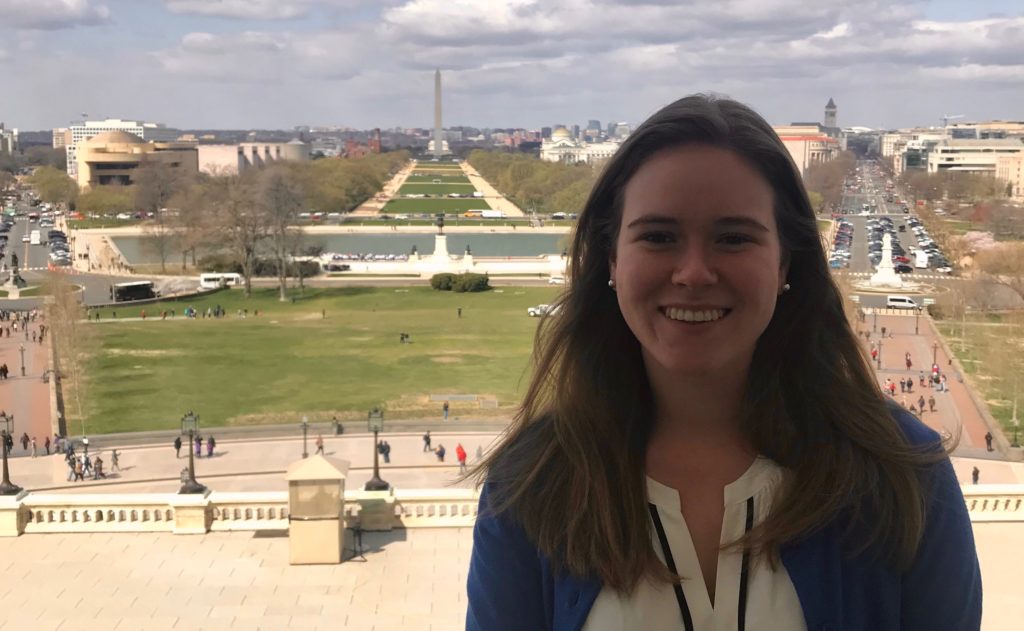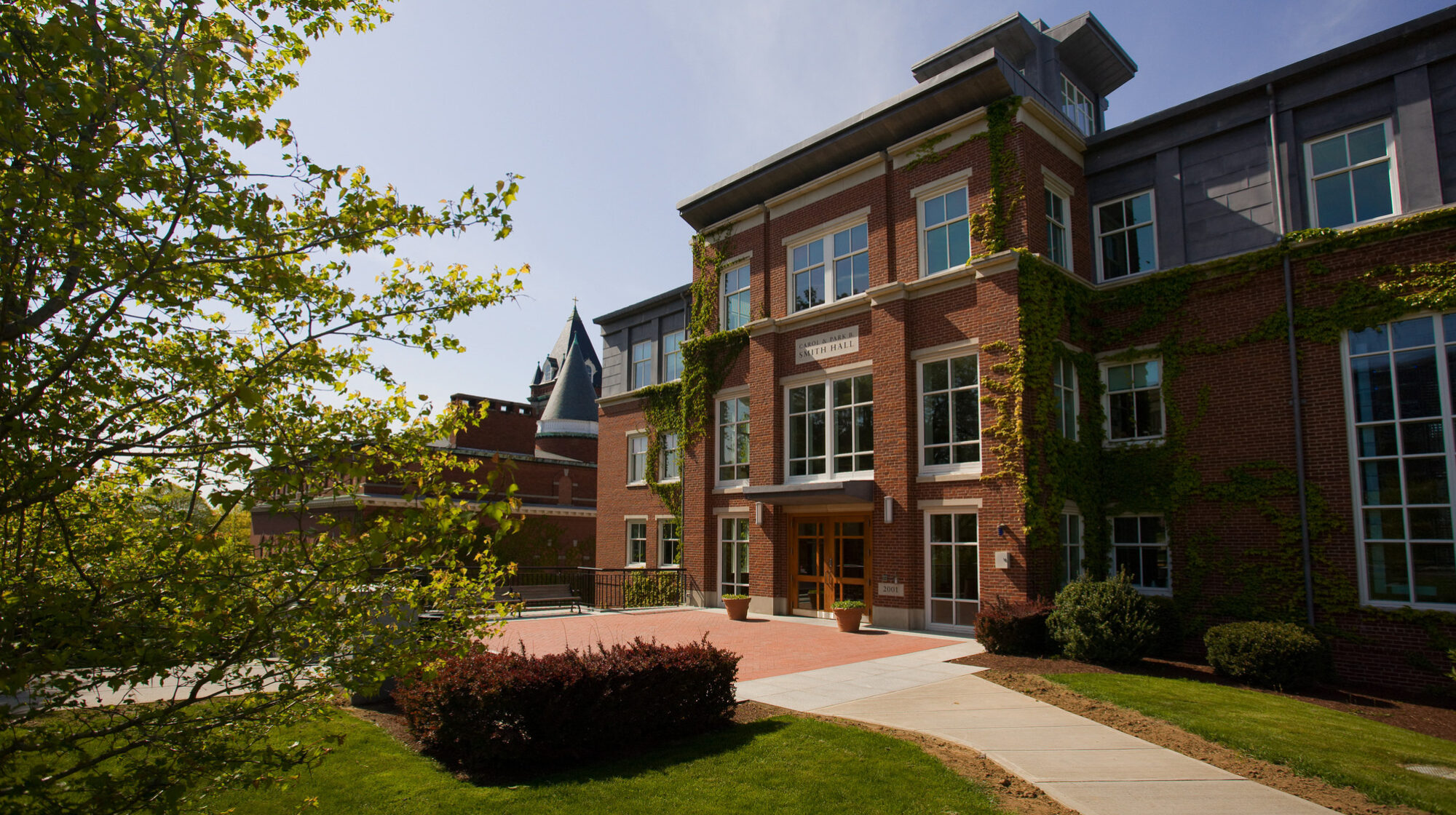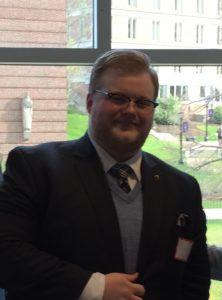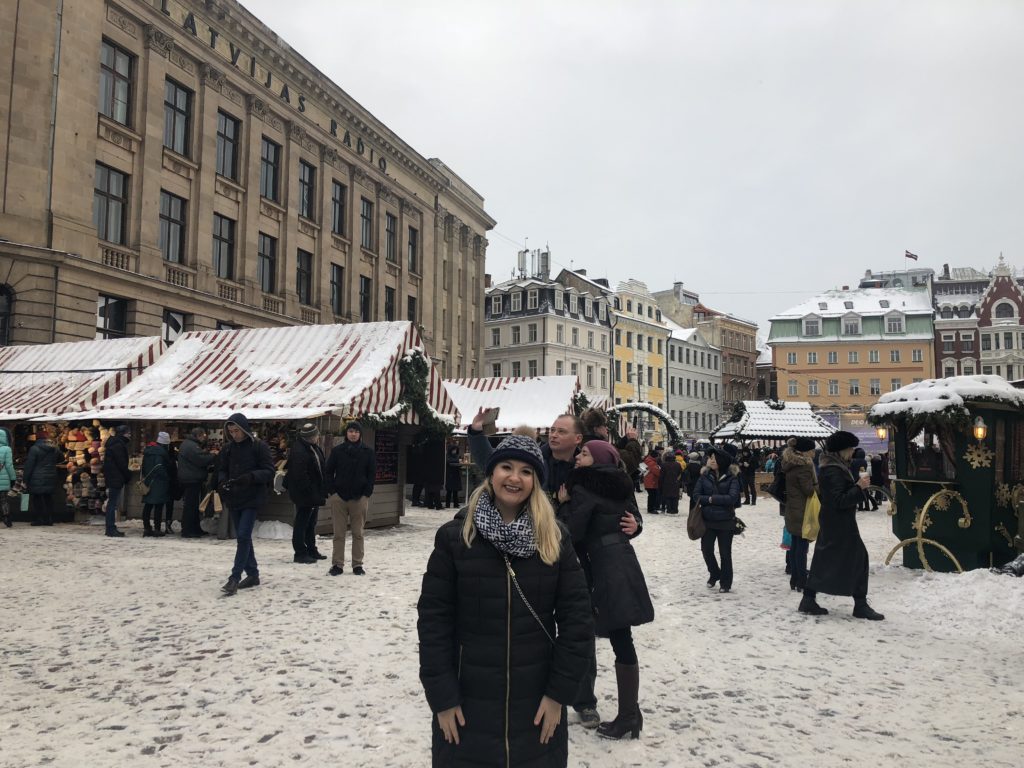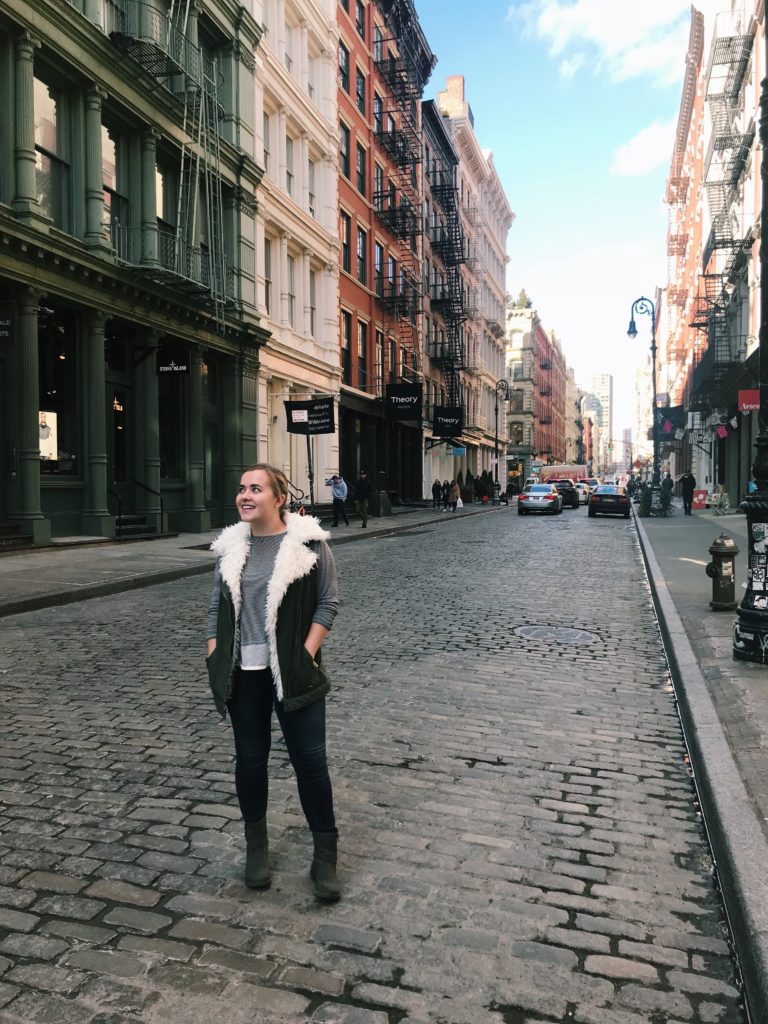
The below post is a reflection by Juliana Holcomb ’19, who studies Psychology and American Sign Language/Deaf Studies. She studied at Gallaudet University in Spring 2018 through the Semester Away program.
The College of the Holy Cross has provided me with countless opportunities to engage in the two-fold goal of Jesuit higher education: excellence in scholarship and service to others in order to improve society. However, the most impactful experience I have had was my semester at Gallaudet University. Studying at Gallaudet allowed me to become an effective ally to the Deaf community: to learn more about how stigma, discrimination, and prejudice affect this community and embrace the history of American Deaf culture by being fully immersed within it. My semester at Gallaudet University has encouraged me to wholly participate in the Jesuit ideal of not only being a “woman for others” but also “a woman with others” while learning many valuable life lessons along the way.
As I first entered Gallaudet University on a frigid January evening, I knew had stepped into a society vastly different than the one I was accustomed to at Holy Cross. From its architecture to cyclical seating in the classrooms and light-up doorbells, Gallaudet is the only university in the world created barrier-free for Deaf and hard-of-hearing students. When I say “Deaf”, with a capital “D”, I am referring to Deaf individuals who identify as part of the Deaf community: a cultural and linguistic minority group. This group is tightknit, supportive, and community-oriented even in the face of discrimination and prejudice that they experience in numerous different settings due to the social perception of their deafness. As a double Psychology and American Sign Language (ASL)/Deaf Studies major, I was immediately drawn to the semester away program at Gallaudet in order to become a better ally to the Deaf community now as well as in my future career. At this institution, Deafness is not defined as a medical condition or something that requires “repair.” Rather, Deafness represents a rich cultural history that started within the United States in 1816, includes the full-time usage of ASL, and encompasses the shared experiences of being Deaf in a predominantly hearing world. In this environment, I am an outsider and have often felt this label. However, in order to be “a woman for and with others”, it is critical that I identify my privilege, as a hearing person, while fully respecting others whose lived experiences differ from mine.
Although my experience at Gallaudet was one of my most memorable, I would be lying if I said that the transition to Gallaudet was easy. Arriving at a campus that I knew I did not fit into was a challenge. As I watched my parents drive away, I had tears welling up in my eyes and could not help but think to myself: “what am I doing here?” After gathering my textbooks and organizing my new dorm room, I decided I would venture to the dining hall for dinner. Walking into this new environment, I was slightly overwhelmed by the large number of people, the noise level (which was surprisingly loud for a Deaf university), and my immediate realization that there were few empty seats. My eyes darted left to right and back, looking for an empty table. I found one hidden in the far back corner and quickly dropped my books, made a salad, and started to walk back towards the table. I became confused because this isolated table I intentionally placed my belongings on was now filled with other students’ backpacks, books, and laptops. Slightly concerned but optimistic, I sat down and started to eat. A few minutes later, a large friend group sat at the table and engulfed me on either side. I smiled at them, hoping it would indicate that I was friendly, but my attempt at engaging seemed to be ignored. The group started to have an exciting conversation around me, and in that moment, I truly felt invisible. I was trying to keep up with what they were saying, but I can honestly say I could not follow the conversation in the slightest – their signing was the fastest I had ever witnessed! In this moment, I had a glimpse into the life of a Deaf person in the hearing world. I began to understand how isolating inaccessible conversations were. In the Deaf community, there is a commonly used term called “dinner table syndrome.” This phrase is used to describe a familial setting, often around the dinner table, in which hearing family members are talking, sharing information, telling jokes, and enjoying each other’s company, solely through a spoken language with little to no attempt of using sign language. The Deaf family member sits at the table tries to keep up with often little to no avail (MT & Associates, 2018). As this is a common theme in the Deaf community, I had learned about it multiple times and understood that it was a significant issue for Deaf individuals. However, until I felt just a small portion of that isolation and exclusion, I realized I had not truly understood why Deaf people were so hurt by it. Although my experience at Gallaudet is not the same as a Deaf person who is constantly interacting with the hearing world, a small glimpse into this experience multiplied my empathy and support for members of this community, especially those who feel like they do not belong in the hearing world.
In addition to a deeper sense of empathy, I acquired a significant amount of humility throughout my experience at Gallaudet. When socially situated in a position of power, it is easy to become accustomed to that level of influence and privilege in daily life. My identity as a hearing, Caucasian, and female college student carries a significant amount of privilege that many others do not share. I did not realize that the confidence I had in the classroom and in social settings stemmed, in part, from systemic features of my educational background as a hearing individual. This was seen poignantly throughout my first few days of classes at Gallaudet. My first course was entitled “Dynamics of Oppression.” In this course, we analyzed large areas of prejudice and analyzed its intersectionality with audism and ableism. I remember walking to class thirty minutes early, getting a seat, taking out a notebook (before I realized notebooks are not commonly used at Gallaudet – it is more important to watch the professor signing), and waiting patiently for class to start. My professor, a lively Deaf man, excitedly asked us to introduce ourselves with our name, class year, and reason for taking this course. I knew I could sign the first two sections of this request; however, the last part? That could get a little tricky. Especially since ASL has a different grammatical structure that English, I was still struggling with making clean translations from one to another. When it got to my turn, I said, “Hello! My name is Juliana. I am a visiting student.” Before I could even attempt the last part of my introduction, the professor interrupted and said “are you hearing?” Due to my mediocre signing, I shyly signed back “yes.” He erupted with laughter and signed back, “IS THIS YOUR FIRST CLASS? GOD BLESS YOU! YOU NEED LUCK AND GOD.” Confused, I laughed and hoped he was being dramatic. I truly wanted to learn as much as possible from my courses and immerse myself in this community. Other than my awkward introduction, my first class went decently well. I understood approximately 70-75% of the signing and knew I had a lot of improving to do but felt hopeful.
However, my second class of the day was a mixed undergraduate and graduate course. “Sign Language Rights and Advocacy” seemed fascinating, and I was excited to learn about the promotion of sign languages on a national and international scale in addition to the multiple settings in which it is advocated. I walked into the classroom, sat down, and read over the syllabus until the class started. My professor explained that she would go over the syllabus shortly, but first, we were going to do an activity. She asked us to break into groups of three or four and then described the directions for the game. I wish I could write about what those were; unfortunately, I understood next to nothing. All I could figure out was that there was a pen involved (because she was pointing at the pen repeatedly), and group members had to come up to the front of the room and do something with the pen. My stomach sunk as I desperately watched my group members chat, trying to understand what was going on. Then, a kind student turned to me with a smile and said: “So, what do you think?” Truthfully, I was thinking that I had no idea how I was going to spend a semester at this school and how I would acquire ASL quick enough to fit in. I thought about the safety and comfort I had acquired at Holy Cross and how much I was missing it. I was also reminiscing on my “past” identity as a student in which I participated regularly in class, went to office hours weekly, and actively engaged with the class material. That student seemed to be a distant memory as I sat in this classroom, unable to even respond to a simple question. My response to my partner translates to something like this: “Pen. We must go get. Who has power to get the pen?” Pushing aside their quizzical looks, my partners began to explain the objective to me. Then, they asked about my experience so far and told me about the great things they were able to accomplish at Gallaudet. In that moment, I realized that this community, although small and tightknit, was caring and accepting of hearing individuals who tried to learn ASL, strived to become an ally for their rights, and followed behindthem in their pursuit for justice. Although faced with prejudice, discrimination, and even hate, this beautiful, cultural community was made up of so many fantastic people that taught me about perseverance in the face of adversity, the importance of collectivism, and humility. Throughout my time at Gallaudet, I had many humbling experiences which allowed me to realize that many of the opportunities I was given were, in large part, resultant of specific types of privilege in my life. Thus, this experience not only allowed me to immerse myself into a different culture but also provided me with a new worldview and prompted me to be a “woman with others.”
Throughout the past three and a half years, Holy Cross has provided me with the opportunity to pursue both Psychology and ASL/Deaf Studies majors. As a result, I have become deeply passionate about mental health advocacy and treatment, especially in the Deaf community. My experience at Gallaudet allowed me to work in a psychological research lab, Dr. Poorna Kushalnagar’s “Deaf Health Communications and Quality of Life Lab”, which allowed me to investigate these topics further. Although there is no correlation between audition and mental distress, Deaf individuals have shown elevated rates of mental illness in comparison to their hearing counterparts (Kvam, Loeb, & Tambs, 2007). Such mental health disparities arise from the lack of accessible mental health information, resources, and treatment coupled with the stigma this community faces. In other words, the increased mental health problems in the Deaf community are avoidable. Therefore, I decided that becoming a Clinical Psychologist for Deaf and hard-of-hearing children and adults would utilize both of my academic passions in a way that would serve others. Through this career, I will strive to be an ally to the Deaf community by listening to and respecting their opinions, advocating for socially just policies, and reducing the deleterious stigma that affects many in this community. Through its in-depth courses and influential professors, Holy Cross has ignited a passion within me to not only provide mental health services to members of the Deaf community but to also stand with them in their efforts for accessibility, equal representation, and equity.
Although my experience at Gallaudet University was filled with challenges ranging from using ASL for every aspect of my day to being an outcast in social settings, it has provided me with the insight to connect classroom material to everyday life while further investigating social injustices within this cultural and linguistic minority group. My experiences at Gallaudet University have fueled my passion to continue on both my academic and personal journeys in order to more fully become a “woman for and with others.”
Reference:
Dinner Table Syndrome and Deaf | MT&A Sign Language Interpreting. (2018, December 03). Retrieved from https://www.mtapractice.com/2016/12/02/dinner-table-syndrome-deaf/
Kvam, M. H., Loeb, M., & Tambs, K. (2007) Mental Health in Deaf Adults: Symptoms of Anxiety and Depression Among Hearing and Deaf Individuals, The Journal of Deaf Studies and Deaf Education, 12(1), 1–7. https://doi.org/10.1093/deafed/enl015
